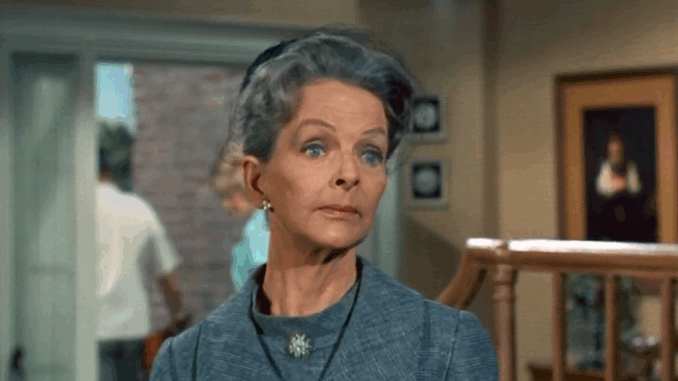
When we look back at the golden age of television and the character actors who helped shape its rich storytelling tapestry, Meg Wyllie stands as a unique pillar of versatility, resilience, and subtle brilliance. Known for her remarkable presence in the 19800s hit series Golden Girl, Wyllie’s performance as the acerbic yet endearing Nurse Clara offered audiences a brief but memorable glimpse into her undeniable talent. However, her story didn’t end there. In fact, Meg Wyllie’s career after Golden Girl is a masterclass in character acting, marked by consistent work, a passion for the stage, and quiet contributions to television history.
Let’s take a closer look at how Meg Wyllie navigated the industry post-Golden Girl, and why her name remains respected among fans and peers alike.
Contents
A Veteran Before Golden Girl

Before she joined the Golden Girl cast, Meg Wyllie had already carved out a solid career in both television and stage productions. Born in Honolulu in 1917 and raised in the Philippines, Wyllie began her acting journey in the Pasadena Playhouse during the 1940s. She soon found herself appearing in a wide variety of television roles throughout the 1950s and 60s, including cult classics like Perry Mason, The Twilight Zone, and Star Trek, in which she played the Talosian “Keeper” in the franchise’s first pilot episode “The Cage” (1965). This variety of early roles showcased her broad emotional range and ability to fully inhabit supporting characters with gravitas.
Golden Girl, a spinoff from The Golden Girls, aired in the late 1980s and served as a launching point for renewed interest in older, experienced actresses. Wyllie’s performance brought nuance to a character that could have easily been overlooked in less capable hands. But for Wyllie, it was just one of many meaningful stops on a journey of creative exploration.
Post-Golden Girl: Embracing the Character Actor’s Path

After her time on Golden Girl, Meg Wyllie continued to work steadily in television. While many actors face diminishing opportunities as they age, Wyllie remained in demand precisely because she could deliver complex portrayals in short scenes with efficiency and emotional truth.
Throughout the late 1980s and early 1990s, she appeared in popular television series such as:
-
General Hospital (as Nurse Doris Roach)
-
Quincy, M.E.
-
Designing Women
-
The Golden Girls (not to be confused with Golden Girl)
These roles, while small, had significant impact. Directors trusted her ability to elevate a scene with minimal screen time. Audiences appreciated her authentic portrayals of authority figures, mothers, neighbors, and hospital staff—roles that mirror real people but are rarely glamorized in pop culture.
Her television work may not have attracted headlines, but it contributed to the realism and emotional richness of each production. Meg Wyllie was the kind of actor who made other actors better—someone who enhanced the scene by grounding it in quiet truth.
Return to the Stage and Love for Theater
Beyond television, Meg Wyllie remained deeply committed to theater. In the early 1990s, she returned to the stage with several regional productions, often choosing plays that allowed her to explore themes of aging, memory, and dignity. In interviews, she expressed that the stage remained her spiritual home—the place where the “actor’s full instrument could be used.”
She performed in several classic works during this period, including:
-
Edward Albee’s A Delicate Balance
-
Tennessee Williams’ The Glass Menagerie (as Amanda Wingfield)
-
Arsenic and Old Lace (as Abby Brewster)
These performances were praised for their depth and conviction, and critics often noted that Wyllie brought a refreshing gravitas to roles often overplayed. Her interpretation of Amanda in The Glass Menagerie, for example, was hailed as “haunting and tender” by the Los Angeles Times.
Meg Wyllie’s Quiet Influence on Future Generations

While Meg Wyllie never became a household name in the traditional sense, her work has had a lasting influence on aspiring actors and casting directors alike. Her ability to deliver dependable, emotionally honest performances made her an industry favorite behind the scenes.
In fact, she became something of a mentor figure to younger actresses on set. It’s well documented that she offered advice and encouragement to performers new to television, particularly women struggling to find strong character roles after age 40. Her advice often centered around one key idea: “Know who your character is—then just be them.”
This practical wisdom is reflected in today’s character actors who strive to bring depth and realism to supporting roles. Wyllie taught by example, proving that every character—no matter how small—has a purpose and can leave a lasting impression.
The Final Years and Lasting Legacy
Meg Wyllie’s last credited screen appearance was in 1995, when she was already in her late seventies. Despite health challenges, she remained involved in the arts community and participated in several local fundraisers for theaters and actors’ charities in Los Angeles.
She passed away in 2002 at the age of 84, leaving behind a body of work that spans over five decades. Though she never had a breakout leading role, her contribution to the industry is undeniable.
She represents the working actor’s ideal: someone who, without glamour or pretense, commits to the craft with honesty, discipline, and heart.
Why Meg Wyllie Matters Today

In an age of instant fame and rapidly shifting entertainment trends, Meg Wyllie’s career serves as a reminder of what really endures in performance art: authenticity, consistency, and dedication. As streaming platforms and limited series formats become more popular, character actors like Wyllie are once again receiving recognition for their crucial contributions to storytelling.
Young performers studying classic TV shows continue to find inspiration in her work. Acting coaches reference her performances in Star Trek, The Twilight Zone, and even her brief turn in Golden Girl as examples of concise, emotionally rich acting. For those looking to build a long-lasting career in entertainment—not just chase celebrity—Meg Wyllie’s story is a blueprint worth following.
Meg Wyllie’s post-Golden Girl career is a powerful testament to the value of resilience, humility, and craft. She may not have sought the spotlight, but she illuminated every scene she entered. Her dedication to storytelling through nuanced, heartfelt performances has earned her a quiet but secure place in television and theater history.
Whether as a nurse in a hospital drama or a matriarch on stage, Meg Wyllie showed us what it means to truly serve the story—and in doing so, she left an indelible mark on generations of actors and audiences alike.
See more at KpopAll and fanpage Golden Girls, Golden Girls.

Leave a Reply